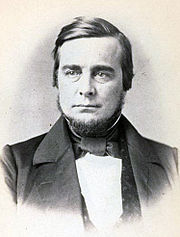Homer Elihu Royce
Homer Elihu Royce (born June 14, 1819 in Berkshire , Vermont , † April 24, 1891 in St. Albans , Vermont) was an American lawyer and politician . Between 1857 and 1861 he represented the third constituency of the state of Vermont in the US House of Representatives .
Career
Homer Royce, nephew of Governor Stephen Royce , attended public schools in his home country. After a subsequent law degree and his admission as a lawyer, he began to work in East Berkshire in his new profession from 1844. Politically, he became a member of the Whigs . In 1847 he was a delegate to their federal party convention, where Zachary Taylor was nominated as a presidential candidate. From 1846 to 1847 Royce was an MP in the Vermont House of Representatives . In 1848 he worked as a lawyer. He was a member of the Vermont Senate from 1849 to 1851, and from 1861 to 1868 .
After the Whig Party disbanded in the 1850s, Royce became a member of the Republican Party, founded in 1854 . In 1856 he was elected as their candidate in the third district of Vermont to the US House of Representatives in Washington, DC , where he succeeded Alvah Sabin on March 4, 1857 . After a re-election in 1858, he was able to complete two terms in Congress until March 3, 1861 . It was during this time that the delegates from the southern states left and the heated discussions in the run-up to the civil war took place . In 1860 Royce declined to run again.
After serving in Congress, he was again a member of the Vermont Senate in 1861 and 1868. In 1870 he became associate judge on the Supreme Court of his state; in 1882 he took over as Chief Justice of its chairmanship. He held this office until his resignation in 1890. Homer Royce died in April 1891. He had been married to Mary T. Edmunds since 1851, with whom he had three children.
Web links
- Homer Elihu Royce in the Biographical Directory of the United States Congress (English)
- Homer Elihu Royce in the database of Find a Grave (English)
| personal data | |
|---|---|
| SURNAME | Royce, Homer Elihu |
| BRIEF DESCRIPTION | American lawyer and politician |
| DATE OF BIRTH | June 14, 1819 |
| PLACE OF BIRTH | Berkshire , Vermont |
| DATE OF DEATH | April 24, 1891 |
| Place of death | St. Albans , Vermont |

